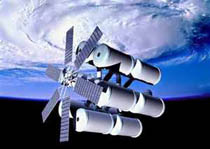




|
Microbiology
and Space Station 2020
Microbes play an important role in our lives and if we live on a Space Station it will be no different. Microbes will be there too, interacting with us, helping us, hindering us, and potentially causing us serious problems such as illnesses. On the Space Station, we will certainly experiment with micro-organisms and we will use them to make some of the special products, that can only be manufactured in space, or made most economically in space. They will also be put to use in the everyday functioning of the Space Station. This will include the recycling of solid waste products - discarded food and feces, for instance, the purification of water and air, and possibly the production of food and medicines. In all these instances, microbes will assist and benefit those aboard and in the day to day operation of the Station. There will also be unwelcome microbes aboard. These will include the obvious ones, such as pathogens that can cause illness, and others that you may not have thought about. For instance, bacteria can degrade metal by helping it to corrode. Similarly, there are bacteria and micro-fungi that can destroy the synthetic rubber of the airlock seals, around the entry hatches, which would allow air to escape from the Station. Both consequences could be lethal in Space. Micro-fungi can also inhabit condensation - a common occurrence on space stations - and release unpleasant spores into the environment. Likewise they, like bacteria, can enter food and cause it to decay. The source of many of these undesirable microbes will be the crew. Microbes love people. They can feed and grow very well on humans! Unfortunately however hard a person tries, by bathing and disinfecting, they will never be able to rid themselves of their unwanted passengers. But while this might be the case, it is also true that good hygienic practices help in keeping microbes in their place and from becoming too big a problem. So, to summarize Where microbes can assist:
Five factors are important:
|
Go
to
Home
| Space Station
| Mars | Rainforest
© 1999 Satellite Events Enterprises Inc.

